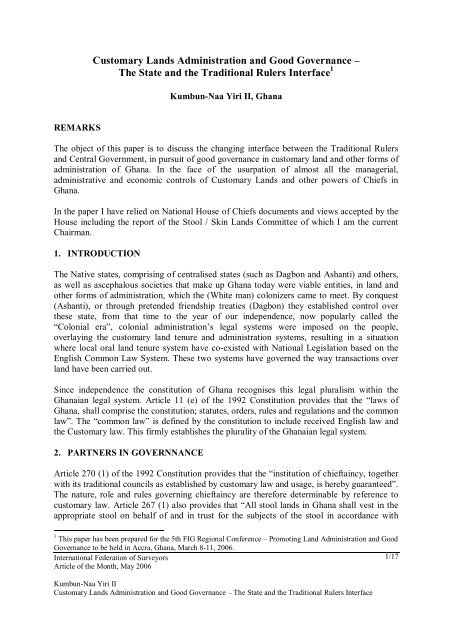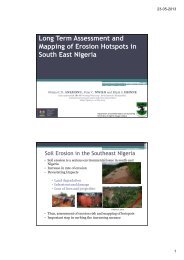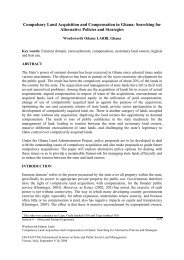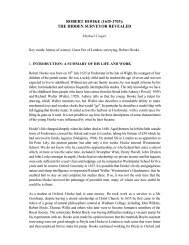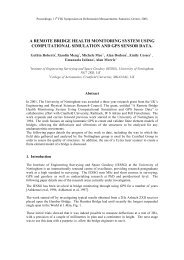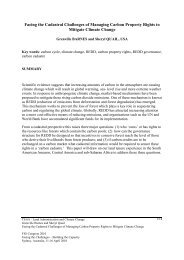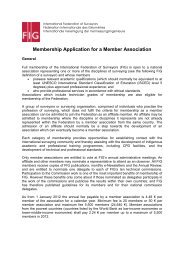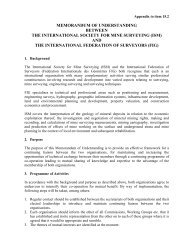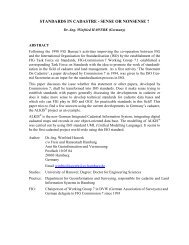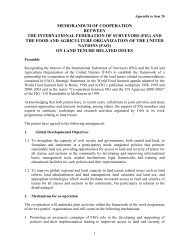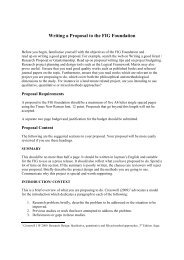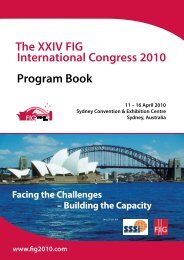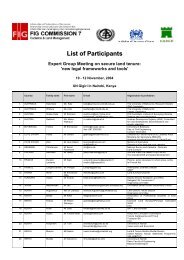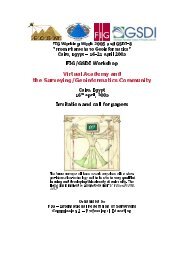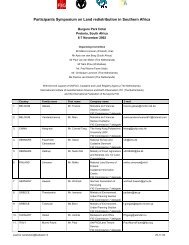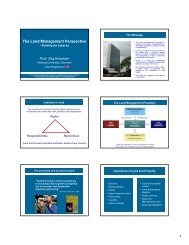Customary Lands Administration and Good Governance – The ... - FIG
Customary Lands Administration and Good Governance – The ... - FIG
Customary Lands Administration and Good Governance – The ... - FIG
Create successful ePaper yourself
Turn your PDF publications into a flip-book with our unique Google optimized e-Paper software.
REMARKS<br />
<strong>Customary</strong> <strong>L<strong>and</strong>s</strong> <strong>Administration</strong> <strong>and</strong> <strong>Good</strong> <strong>Governance</strong> <strong>–</strong><br />
<strong>The</strong> State <strong>and</strong> the Traditional Rulers Interface 1<br />
Kumbun-Naa Yiri II, Ghana<br />
<strong>The</strong> object of this paper is to discuss the changing interface between the Traditional Rulers<br />
<strong>and</strong> Central Government, in pursuit of good governance in customary l<strong>and</strong> <strong>and</strong> other forms of<br />
administration of Ghana. In the face of the usurpation of almost all the managerial,<br />
administrative <strong>and</strong> economic controls of <strong>Customary</strong> <strong>L<strong>and</strong>s</strong> <strong>and</strong> other powers of Chiefs in<br />
Ghana.<br />
In the paper I have relied on National House of Chiefs documents <strong>and</strong> views accepted by the<br />
House including the report of the Stool / Skin <strong>L<strong>and</strong>s</strong> Committee of which I am the current<br />
Chairman.<br />
1. INTRODUCTION<br />
<strong>The</strong> Native states, comprising of centralised states (such as Dagbon <strong>and</strong> Ashanti) <strong>and</strong> others,<br />
as well as ascephalous societies that make up Ghana today were viable entities, in l<strong>and</strong> <strong>and</strong><br />
other forms of administration, which the (White man) colonizers came to meet. By conquest<br />
(Ashanti), or through pretended friendship treaties (Dagbon) they established control over<br />
these state, from that time to the year of our independence, now popularly called the<br />
“Colonial era”, colonial administration’s legal systems were imposed on the people,<br />
overlaying the customary l<strong>and</strong> tenure <strong>and</strong> administration systems, resulting in a situation<br />
where local oral l<strong>and</strong> tenure system have co-existed with National Legislation based on the<br />
English Common Law System. <strong>The</strong>se two systems have governed the way transactions over<br />
l<strong>and</strong> have been carried out.<br />
Since independence the constitution of Ghana recognises this legal pluralism within the<br />
Ghanaian legal system. Article 11 (e) of the 1992 Constitution provides that the “laws of<br />
Ghana, shall comprise the constitution; statutes, orders, rules <strong>and</strong> regulations <strong>and</strong> the common<br />
law”. <strong>The</strong> “common law” is defined by the constitution to include received English law <strong>and</strong><br />
the <strong>Customary</strong> law. This firmly establishes the plurality of the Ghanaian legal system.<br />
2. PARTNERS IN GOVERNNANCE<br />
Article 270 (1) of the 1992 Constitution provides that the “institution of chieftaincy, together<br />
with its traditional councils as established by customary law <strong>and</strong> usage, is hereby guaranteed”.<br />
<strong>The</strong> nature, role <strong>and</strong> rules governing chieftaincy are therefore determinable by reference to<br />
customary law. Article 267 (1) also provides that “All stool l<strong>and</strong>s in Ghana shall vest in the<br />
appropriate stool on behalf of <strong>and</strong> in trust for the subjects of the stool in accordance with<br />
1<br />
This paper has been prepared for the 5th <strong>FIG</strong> Regional Conference <strong>–</strong> Promoting L<strong>and</strong> <strong>Administration</strong> <strong>and</strong> <strong>Good</strong><br />
<strong>Governance</strong> to be held in Accra, Ghana, March 8-11, 2006.<br />
International Federation of Surveyors<br />
1/17<br />
Article of the Month, May 2006<br />
Kumbun-Naa Yiri II<br />
<strong>Customary</strong> <strong>L<strong>and</strong>s</strong> <strong>Administration</strong> <strong>and</strong> <strong>Good</strong> <strong>Governance</strong> <strong>–</strong> <strong>The</strong> State <strong>and</strong> the Traditional Rulers Interface
customary law <strong>and</strong> usage”. Deficiency in the knowledge of customary law, therefore will have<br />
serious implications for the institution of chieftaincy as well as in the management of stool<br />
l<strong>and</strong>s (which constitute a very crucial resource in this country). Presently customary law is<br />
mostly undocumented. It is not surprising therefore, to see that there are some problems in<br />
customary l<strong>and</strong> management in Ghana.<br />
<strong>Customary</strong> l<strong>and</strong>s, comprising of l<strong>and</strong>s owned by stools, skins, clans <strong>and</strong> families <strong>and</strong><br />
Tendamba etc. constitute about 80% of all l<strong>and</strong>s in Ghana. <strong>The</strong>se customary l<strong>and</strong>s cover most<br />
of the rural l<strong>and</strong>s <strong>and</strong> some of the urban l<strong>and</strong>s. <strong>Customary</strong> l<strong>and</strong>s support the livelihoods of the<br />
majority of the population <strong>and</strong> therefore the sustainable management of such l<strong>and</strong>s is critical<br />
to the socio-economic development of the country. So Traditional Rulers (Chiefs) who are the<br />
occupants of stools <strong>and</strong> skins etc. who hold those l<strong>and</strong>s in trust for their subjects are important<br />
stakeholders in customary l<strong>and</strong> administration <strong>and</strong> can play a key role in complimenting<br />
Government’s efforts in the <strong>Good</strong> <strong>Governance</strong> of the Country.<br />
Ghana as a country is heavily dependent on primary l<strong>and</strong> <strong>–</strong> based products for its socioeconomic<br />
growth. Cocoa, Timber, Gold, Diamonds <strong>and</strong> other precious mineral etc. are<br />
leading in sector contributions to the country’s gross domestic products. <strong>The</strong> implication of<br />
this is that, easy access to l<strong>and</strong>, security of l<strong>and</strong> tenure <strong>and</strong> the wise use of the national l<strong>and</strong><br />
resource will indicate the pace of our national socio-economic growth. For this <strong>and</strong> other<br />
reasons neither the Government holding about 20% of the l<strong>and</strong>s of Ghana nor the Traditional<br />
Rulers (Chiefs) <strong>–</strong> holding about 80% acting alone can address the numerous problems in the<br />
l<strong>and</strong> sector. <strong>The</strong>y are therefore partners in good governance.<br />
2.1 Contribution of Traditional Rulers to <strong>Good</strong> <strong>Governance</strong>: Current Position of a Chief<br />
In present day Ghana the position of the chief is complimentary to the government. <strong>The</strong> chief<br />
is the single most visible governance institution in Ghana today, there is a chief in every town<br />
<strong>and</strong> village. <strong>The</strong> central Government is not so visible.<br />
In many towns <strong>and</strong> villages, the chief is responsible for law <strong>and</strong> order. He is also a doctor <strong>and</strong><br />
a councillor. <strong>The</strong> first person to receive any report of any breach of peace is the Chief. <strong>The</strong><br />
Ghana Police Service is a very small force <strong>and</strong> is not present in every town or village. Further<br />
the Chief is the centre of social cohesion today <strong>and</strong> virtually every segment of society<br />
revolves round the chief <strong>and</strong> the chief holds all parts of the society together. In addition <strong>and</strong><br />
even more important the chief is the leader for development. Prominent chiefs such as Nana<br />
Okyenhene Amoatia Ofori Panyin, Nana Otumfuo Osei Tutu II <strong>and</strong> Ya-Naa Yakubu II have<br />
demonstrated on the National level the critical developmental role of the chief in modern<br />
times, to varying degrees the rest of us other chiefs are playing our roles. <strong>The</strong> chief is also a<br />
political mediator. He mediates between different groups in conflict both within the state <strong>and</strong><br />
society.<br />
Finally, the chiefs have become a major source of advice for government (Article 272 of 1992<br />
Constitution) especially on traditional matters. <strong>The</strong> importance of the chief in contemporary<br />
Ghana is a significant <strong>and</strong> incontrovertible fact of our political life. In addition to all the<br />
above, the Traditional Rulers own 80% of the l<strong>and</strong>s of Ghana <strong>and</strong> of course the 20% public by<br />
created law.<br />
International Federation of Surveyors<br />
Article of the Month, May 2006<br />
Kumbun-Naa Yiri II<br />
<strong>Customary</strong> <strong>L<strong>and</strong>s</strong> <strong>Administration</strong> <strong>and</strong> <strong>Good</strong> <strong>Governance</strong> <strong>–</strong> <strong>The</strong> State <strong>and</strong> the Traditional Rulers Interface<br />
2/17
From time immemorial the institution of chieftaincy has long ensured fair distribution of l<strong>and</strong><br />
<strong>and</strong> l<strong>and</strong> resource among the people. <strong>The</strong> institution encourages resource mobilization such as<br />
fund raising, levies <strong>and</strong> communal labour. At the local level, the chief ensures that resources<br />
are both fairly mobilised <strong>and</strong> distributed for development in both local <strong>and</strong> national contexts.<br />
At political party level, even though the Ghanaian Constitution in Article 276 (1) bars chiefs<br />
from participation in active party politics, all politicians at time of elections try to outwit each<br />
to catch the eye of the chief. <strong>The</strong> Palaces of Chiefs are also centres where government policies<br />
are explained <strong>and</strong> advertised to the people in the rural areas.<br />
By Article 272 (a) the institution of chieftaincy is responsible for advising Government on<br />
any matter relating to or affecting chieftaincy. In the opinion of the Traditional Rulers a<br />
matter affecting the administration of customary l<strong>and</strong> is a matter relating to or affecting the<br />
institution of chieftaincy. <strong>The</strong>refore Traditional Authorities have the constitutional<br />
responsibility to advise Government on the types of laws that will ensure good governance in<br />
the administration of customary l<strong>and</strong>s of this country <strong>and</strong> in other matters relating to the<br />
institution of chieftaincy.<br />
3. CUSTOMARY LAND ADMINISTRATION AT THE TRADITIONAL LEVEL<br />
Under customary law practices, the chief is the Father of his people <strong>and</strong> custodian of<br />
customary practices.. Under the customary law, the chief is also “in change” <strong>and</strong> responsible<br />
for the legal alienation of customary l<strong>and</strong>s under his jurisdiction in consultation with his<br />
elders.<br />
<strong>The</strong> ownership or control of l<strong>and</strong> under customary law starts at the paramouncy holding the<br />
allodial Title, followed by Divisional <strong>and</strong> Sub-Chiefs (appointed by the Paramount) who hold,<br />
“<strong>Customary</strong> Freehold” the indigenes hold usufruct interest in the l<strong>and</strong>. Thus the Hierarchy of<br />
<strong>Customary</strong> L<strong>and</strong> holdings are:<br />
<strong>The</strong> Paramount Chief - Allodial Owner<br />
<strong>The</strong> Divisional Chief - <strong>Customary</strong> Freehold<br />
<strong>The</strong> Sub-Chief - <strong>Customary</strong> Freehold<br />
<strong>The</strong> Indigenes (subjects) - Usufruct Interest<br />
In centralised states like Dagbon, in Northern Ghana <strong>and</strong> Ashanti in the Southern Ghana <strong>and</strong><br />
in some other Traditional Areas, the l<strong>and</strong> cannot be sold outright ie. be permanently alienated<br />
but can only be leased with approval of the chief. <strong>The</strong> question of buying l<strong>and</strong> outright was<br />
never an issue under customary l<strong>and</strong> administration. All citizens had access to l<strong>and</strong> for<br />
whatever purpose they desired to use it. No indigene was ever denied l<strong>and</strong> in the traditional<br />
state. <strong>The</strong> same exists up to today in the rural areas. Under Traditional Rule all citizens of the<br />
state have access to l<strong>and</strong>.<br />
It is true that boundaries of l<strong>and</strong>s, be they farm l<strong>and</strong>s, residential l<strong>and</strong>s or l<strong>and</strong>s under the<br />
supervision of chiefs were marked by natural features or l<strong>and</strong>marks such as trees, rivers,<br />
anthills, hills or even mounts constructed by two parties sharing the boundaries, together with<br />
oral description were the hallmarks of boundary identification under customary law.<br />
International Federation of Surveyors<br />
Article of the Month, May 2006<br />
Kumbun-Naa Yiri II<br />
<strong>Customary</strong> <strong>L<strong>and</strong>s</strong> <strong>Administration</strong> <strong>and</strong> <strong>Good</strong> <strong>Governance</strong> <strong>–</strong> <strong>The</strong> State <strong>and</strong> the Traditional Rulers Interface<br />
3/17
When l<strong>and</strong> was used mostly for agricultural purposes little problems existed between<br />
neighbours. But today, greed for l<strong>and</strong> ownership expressed in l<strong>and</strong> speculation in the cities<br />
<strong>and</strong> urban areas have rendered natural features, which are subject to disappearance <strong>and</strong><br />
change, as boundary marks, uncertain <strong>and</strong> insecure. This coupled with the need to hold<br />
documents that show “ownership” of the l<strong>and</strong> held <strong>and</strong> the nature of interest held in the l<strong>and</strong><br />
are among the issues that have ushered in the multiple problems in l<strong>and</strong> tenure systems in this<br />
country particularly at the customary level. Furthermore increase in population leading to the<br />
general rush of people to the cities <strong>and</strong> towns from the rural areas as well as l<strong>and</strong> degradation<br />
in the savanna areas leading to a drift of farmers of the North to the fertile areas of Southern<br />
Ghana have further compounded the l<strong>and</strong> problems.<br />
4. PROBLEMS BESETING CUSTOMARY LAND ADMINISTRATION<br />
In view of the traditional ways of l<strong>and</strong> allocation <strong>and</strong> l<strong>and</strong> alienation in the past, the modern<br />
day management of customary l<strong>and</strong>s by Traditional Authorities has been beset with some<br />
problems, including, as already stated, indeterminate boundaries of customary l<strong>and</strong>s, poor<br />
records or no record keeping, which sometimes results in the allocation of the same parcel of<br />
l<strong>and</strong> to more than one person, registering at Deeds Registry <strong>and</strong> at L<strong>and</strong> Title Registry of the<br />
same document by different people, agricultural tenancies based on oral agreement, different<br />
tenurial arrangements at different parts of the country, depending on the Traditional area,<br />
chieftaincy / l<strong>and</strong> disputes between two Traditional Overlords, claims <strong>and</strong> counter claims over<br />
disputed l<strong>and</strong> due to lack of proper maps <strong>and</strong> plans of scientific accuracy <strong>and</strong> the<br />
disappearance of natural features marking the boundaries leading to lack of security of tenure.<br />
5. OBSERVATIONS AND CONCERNS OF TRADITIONAL RULERS ON<br />
GOVERNMENT INTERVENTIONS IN STOOL LANDS ADMINISTRATION<br />
In solving the problems enumerated <strong>and</strong> other problems of <strong>Customary</strong> L<strong>and</strong> <strong>Administration</strong>,<br />
Government enacted stifling laws <strong>and</strong> regulations that have been of great concern to<br />
Traditional Rulers.<br />
In looking at these laws Traditional Authorities are concerned that whatever the good<br />
intentions or utterances of the state with regards to none direct intervention or interference in<br />
customary l<strong>and</strong> administration <strong>and</strong> management, practical actions of state functionaries are<br />
often to the contrary.<br />
Historically, it has been observed that the immediate post <strong>–</strong> independence era, when national<br />
governance came into the h<strong>and</strong>s of fellow Ghanaians, was characterised by a marked increase<br />
in the l<strong>and</strong> capacity of the Central Government. A rapid succession of statutes armed the<br />
Republic with far reaching powers to expropriate l<strong>and</strong>, to control l<strong>and</strong> use <strong>and</strong> to administer a<br />
considerable sector of l<strong>and</strong>ed property. With respect to stool l<strong>and</strong>s, the legislation conferring<br />
sweeping powers on the Republic revolved around four themes: <strong>The</strong> conservation of natural<br />
resources, the control of l<strong>and</strong> use, enhanced powers of expropriation <strong>and</strong> the assumption of<br />
the managerial <strong>and</strong> judiciary powers of stools in respect of unencumbered stool l<strong>and</strong>s.<br />
International Federation of Surveyors<br />
Article of the Month, May 2006<br />
Kumbun-Naa Yiri II<br />
<strong>Customary</strong> <strong>L<strong>and</strong>s</strong> <strong>Administration</strong> <strong>and</strong> <strong>Good</strong> <strong>Governance</strong> <strong>–</strong> <strong>The</strong> State <strong>and</strong> the Traditional Rulers Interface<br />
4/17
6. EXPROPRIATION AND APPROPRIATION OF STOOLS LANDS<br />
“Although the formal trappings of ownership of stool l<strong>and</strong>s were left in the h<strong>and</strong>s of stools,<br />
the management of the stool l<strong>and</strong>s was expressly vested in the Government. Management in<br />
this context consisted of an impressive array of regulatory powers such as the power to<br />
approve dispositions of stool l<strong>and</strong>s for valuable consideration, the power to grant concessions<br />
affecting stools, the power of the President to intervene in litigation concerning stool l<strong>and</strong>s,<br />
<strong>and</strong> the power of summary expropriation <strong>and</strong> appropriation of use in the public interest<br />
(<strong>Administration</strong> of L<strong>and</strong> Act. 123)”.<br />
<strong>The</strong> 1992 Constitution, however, has ushered in a more liberal regime with respect to stool<br />
l<strong>and</strong>s. First, Article 267 (1) unequivocally affirms stool ownership of stool l<strong>and</strong>s as follows :<br />
“All stool l<strong>and</strong>s in Ghana shall be vested in the appropriate stool on behalf of, <strong>and</strong> in<br />
trust for, the subjects of the stool in accordance with customary law <strong>and</strong> usage”.<br />
However, the Constitution does not vest the management of stool l<strong>and</strong>s in the Government or<br />
the <strong>L<strong>and</strong>s</strong> Commission or any other public office or body. <strong>The</strong> managerial jurisdiction of the<br />
<strong>L<strong>and</strong>s</strong> Commission is limited to public l<strong>and</strong>s (Article 258 (1)). <strong>The</strong> Constitution establishes<br />
the Office of the Administrator of Stool <strong>L<strong>and</strong>s</strong>, which is responsible for collecting all<br />
revenues accruing from each stool <strong>and</strong> distributing them in accordance with a formula<br />
explicitly stipulated by the Constitution (Article 267 (1)). But the Administrator of Stool<br />
<strong>L<strong>and</strong>s</strong> does not have a general constitutional m<strong>and</strong>ate to manage stool l<strong>and</strong>s.<br />
Beyond the above powers of the Administrator of Stool <strong>L<strong>and</strong>s</strong>, the only managerial power<br />
vested in an authority other than the appropriate stool is the requirement of a planning<br />
certification from the appropriate Regional <strong>L<strong>and</strong>s</strong> Commission as a prerequisite for the<br />
disposition or development of any stool as stipulated in Article 267(3).<br />
Happily, the summary powers of expropriation vested in the President in 1962 enactment are<br />
superseded by the emphatic guarantees against expropriation or deprivation of property under<br />
Article 20 of the 1992 Constitution which stipulates that, “no property of any description or<br />
interest in or right over any property shall be compulsorily taken possession of or acquired by<br />
the state unless certain conditions are satisfied”. Namely, the acquisition is in the public<br />
interest, the necessity for such acquisition is clearly stated <strong>and</strong> that the acquisition is affected<br />
by a law, which makes provision for the prompt payment of fair <strong>and</strong> adequate compensation.<br />
This was not the case in Act 123. <strong>The</strong> President had power to vest any stool l<strong>and</strong> in himself if<br />
it appeared or seemed to the President to be in the public interest to do so. Monies accruing<br />
from this vested stool l<strong>and</strong> was to be paid to an Account administered by Central Government<br />
called “Stool L<strong>and</strong> Account”.<br />
Even though the new constitutional provision promises a more liberal regime for stool l<strong>and</strong>s<br />
with the unequivocal vesting of stool l<strong>and</strong>s in the appropriate stools in trust for their subjects,<br />
the incidents of this ownership have become nebulous by the persistence of old intrusive<br />
legislation <strong>and</strong> administrative practices as well as by the enactment of new legislation which<br />
appears to contravene the constitutional protections for the stool l<strong>and</strong>. <strong>The</strong> enactment of the<br />
<strong>L<strong>and</strong>s</strong> Commission Act pursuant to the constitutional provisions on the L<strong>and</strong> Commission,<br />
the <strong>Administration</strong> of <strong>L<strong>and</strong>s</strong> Act <strong>and</strong> many other laws regulating stool l<strong>and</strong>s still remain in the<br />
International Federation of Surveyors<br />
Article of the Month, May 2006<br />
Kumbun-Naa Yiri II<br />
<strong>Customary</strong> <strong>L<strong>and</strong>s</strong> <strong>Administration</strong> <strong>and</strong> <strong>Good</strong> <strong>Governance</strong> <strong>–</strong> <strong>The</strong> State <strong>and</strong> the Traditional Rulers Interface<br />
5/17
statute books. <strong>The</strong>se laws are not only repugnant to the constitution but are also inimical to<br />
sound economic management of stool l<strong>and</strong>s.<br />
7. ILLEGAL EXPROPRIATION OF STOOL LANDS TIMBER REVENUE<br />
<strong>The</strong> hope that the 1992 Constitution has ushered in a more liberal regime for stool l<strong>and</strong>s has<br />
been dashed by recent enactment of statutes <strong>and</strong> regulations governing the utilization <strong>and</strong><br />
management of forest resources on stool l<strong>and</strong>s. Royalties from the utilization of timber<br />
formerly constituted the bulk of stool l<strong>and</strong> revenues. Recent legislation <strong>and</strong> regulations<br />
affecting timber exploitation have expropriated the bulk of this revenues - as much as 60% of<br />
these royalties- ostensibly as management fees charged by the Forestry Commission. When<br />
this exorbitant charge is added to the constitutionally sanctioned administrative fee of 10%<br />
payable to the <strong>Administration</strong> of Stool <strong>L<strong>and</strong>s</strong>, <strong>and</strong> the m<strong>and</strong>atory 55% of the remaining<br />
revenues allocated to District Assemblies, then it is no exaggeration to assert that recent<br />
legislation <strong>and</strong> regulations constitute expropriation of stool property without compensation,<br />
<strong>and</strong> a grave violation of the Constitution.<br />
District Assemblies have notoriously failed to expend their portion of stool revenues on the<br />
development of traditional areas concerned.<br />
It appears that the assumptions of National L<strong>and</strong> Policy framers are:<br />
(1) <strong>Customary</strong> L<strong>and</strong>owners Stool / Skins etc. are incapable of administering stool l<strong>and</strong>s <strong>and</strong><br />
stool revenues efficiently <strong>and</strong> in the interests of their subjects. Chiefs <strong>and</strong> Traditional<br />
Authorities are not enlightened enough to be entrusted with rational administration of<br />
their l<strong>and</strong>s.<br />
(2) <strong>The</strong> real solution for our l<strong>and</strong> problems lies in entrusting l<strong>and</strong> administration, whether in<br />
respect of public l<strong>and</strong>s or stool l<strong>and</strong>s, to government departments, or other public<br />
institutions such as the <strong>L<strong>and</strong>s</strong> Commission or the Forestry Commission.<br />
8. TRADITIONAL AUTHORITIES SHARE OF THE BLAME<br />
In addressing the above issues, it has to be conceded that the <strong>Administration</strong> of Stool <strong>L<strong>and</strong>s</strong><br />
by the traditional authorities in the past has been unblemished. <strong>The</strong>re has been some incidence<br />
of breach of trust or inept administration on the part of some traditional authorities in the past<br />
such as encroachments, double sale of parcels of l<strong>and</strong>, use of unapproved schemes <strong>and</strong> use of<br />
l<strong>and</strong> guards <strong>and</strong> misappropriation of stool revenue.<br />
But it is naïve to proceed on that basis that the solution lies in the administration of l<strong>and</strong>s by<br />
state bureaucracies. <strong>The</strong> frustrations encountered by domestic <strong>and</strong> foreign investors in<br />
processing l<strong>and</strong> acquisitions at various State Agencies will dispose of any lingering<br />
assumptions about the efficacy of state management of l<strong>and</strong>s.<br />
9. STATE LAND MANAGEMENT<br />
State administration of l<strong>and</strong> has proved to be one of the most inefficient <strong>and</strong> unproductive<br />
undertakings in the public sector. Nor can it be confidently asserted that the management of<br />
forests by state officials has enhanced our forestry resources. <strong>The</strong> degradation of forests <strong>and</strong><br />
International Federation of Surveyors<br />
Article of the Month, May 2006<br />
Kumbun-Naa Yiri II<br />
<strong>Customary</strong> <strong>L<strong>and</strong>s</strong> <strong>Administration</strong> <strong>and</strong> <strong>Good</strong> <strong>Governance</strong> <strong>–</strong> <strong>The</strong> State <strong>and</strong> the Traditional Rulers Interface<br />
6/17
the environment, the indiscriminate exploitation of timber without corresponding reforestation<br />
<strong>and</strong> the wanton destruction of agriculture crops by timber operators have been the<br />
hallmark of state control over forest resources. State agencies should not desist from<br />
depriving stools as l<strong>and</strong>owners of their legitimate revenues but should consult them for<br />
appropriate inputs in the management of these natural resources.<br />
What traditional authorities need from state agencies with respect to the administration of<br />
stool l<strong>and</strong>s generally is not depriving or stifling control but sound technical advice <strong>and</strong><br />
financial support in harassing the resources for the benefit of the entire community.<br />
<strong>The</strong>y, the Traditional Authorities, being more representative at the grass roots, of this country,<br />
do not need stifling laws <strong>and</strong> regulations that make them <strong>and</strong> their subjects tenants on their<br />
own l<strong>and</strong>s or at best gaping spectators while stifling laws whittle away their l<strong>and</strong>s <strong>and</strong> source<br />
of income, birthrights, <strong>and</strong> authorities. <strong>The</strong> deprivation of stool resources diminishes the<br />
capacity of chiefs to deliver the social <strong>and</strong> economic services expected of them.<br />
9.1 Nananom, <strong>The</strong> Traditional Rulers <strong>and</strong> LAP<br />
In yet another attempt to address l<strong>and</strong> problems, the National L<strong>and</strong> Policy was inaugurated.<br />
Ghana’s L<strong>and</strong> <strong>Administration</strong> Project (LAP) is said to be the Government of Ghana’s<br />
programme to implement the National L<strong>and</strong> Policy of 1999. It is a departure from past<br />
practice in the sense that LAP was designed to apply participatory processes in policy<br />
development <strong>and</strong> legislative reform. Since about 80% of the l<strong>and</strong>s of Ghana is under<br />
customary tenure <strong>and</strong> in view of the centrality of (Nananom) Traditional Authorities in l<strong>and</strong><br />
administration <strong>and</strong> management the programme has identified (Nananom) Chiefs as<br />
indispensable stakeholders with whom sustained engagement is imperative, if the reform<br />
effort is to yield the desired results. This without doubt is very welcome to the National<br />
House of Chiefs (NHC), the Traditional Rulers of this country. For that <strong>and</strong> other reasons the<br />
document entitled Legislative <strong>and</strong> Judicial Review Draft Final Report was presented to the<br />
NHC for their comments <strong>and</strong> suggestions. It was on the score of this <strong>and</strong> to contribute to the<br />
<strong>Good</strong> <strong>Governance</strong> of Ghana that the National House of Chiefs (NHC) undertook through its<br />
stool /skin l<strong>and</strong>s committee to go through the Ministry of <strong>L<strong>and</strong>s</strong>, Forestry <strong>and</strong> Mines<br />
commissioned draft report “Ghana L<strong>and</strong> <strong>Administration</strong> Project, Legislative <strong>and</strong> Judicial<br />
Review <strong>–</strong> Draft Final Report”.<br />
Comments on the draft final report which was submitted to Nananom / Traditional Rulers of<br />
this country at the National House of Chiefs have since been submitted to the Ministry for<br />
inclusion in the Final Report.<br />
<strong>The</strong> purpose now for touching on it is to indicate of the many ways Traditional Rulers of<br />
Ghana have been contributing to good governance in the area of l<strong>and</strong> administration <strong>and</strong> other<br />
areas of governance.<br />
International Federation of Surveyors<br />
Article of the Month, May 2006<br />
Kumbun-Naa Yiri II<br />
<strong>Customary</strong> <strong>L<strong>and</strong>s</strong> <strong>Administration</strong> <strong>and</strong> <strong>Good</strong> <strong>Governance</strong> <strong>–</strong> <strong>The</strong> State <strong>and</strong> the Traditional Rulers Interface<br />
7/17
10. METHODOLOGY ADOPTED BY THE STOOL / SKIN LANDS COMMITTEE IN<br />
THE STUDY OF THE DOCUMENT<br />
In discussing the Report of the consultants it was first agreed that where no comment was<br />
made by Nananom, the Traditional Rulers, concerning any statement or recommendations in<br />
the Draft Final Report, it indicated that we had no objection to that statement or<br />
recommendation, same was therefore recommended to the House for approval. Proceeding<br />
from this point of view, we observed that the Final Draft Report consisted of four parts as<br />
follows:<br />
EXECUTIVE SUMMARY, CURRENT POLICY OBJECTIVES, LEGISLATIVE AND<br />
JUDICIAL COMPONENT OF LAP-1, THIS WAS ATTACHED TO THE REPORT AS<br />
APPENNDIX A, DRAFT, MEMORADUM FOR ENACTMENT OF HARMONIZED<br />
LAND ADMINISTRATION CODE.<br />
Components Of <strong>The</strong> Memor<strong>and</strong>um For Enactment Of Harmonised L<strong>and</strong><br />
<strong>Administration</strong> Code<br />
PART ONE OF THE CODE-LAND TENURE consisted of Legislative Provisions regulating:<br />
a. Security of Tenure<br />
b. Ownership rights including the substantive laws governing l<strong>and</strong> holdings in<br />
different categories <strong>and</strong><br />
c. Provision dealing with the recording <strong>and</strong> registration of deeds titles <strong>and</strong> interests in<br />
l<strong>and</strong>.<br />
PART TWO OF THE CODE-LAND MANAGEMENT also consisted of Legislative<br />
provisions which deals with:<br />
a. Compulsory acquisition of l<strong>and</strong><br />
b. Vesting<br />
c. Institutional arrangements for l<strong>and</strong> administration<br />
d. Management of public l<strong>and</strong>s<br />
PART THREE OF THE CODE-LAND USE PLANNING consisted of Legislative provision<br />
regulating l<strong>and</strong>s use planning :<br />
a. Provisions on formulation of planning schemes <strong>and</strong> layouts<br />
b. <strong>The</strong> granting of planning permissions, development permits <strong>and</strong><br />
c. Provisions regulating the physical development <strong>and</strong> use of l<strong>and</strong><br />
<strong>The</strong> above provided the basis for looking at both the Final Draft Report <strong>and</strong> the Attached<br />
Memor<strong>and</strong>um.<br />
<strong>The</strong> Stool / Skin <strong>L<strong>and</strong>s</strong> Committee after critically discussing the Executive Summary made<br />
the following comments <strong>and</strong> recommendations.<br />
a. That consideration needed to be given the different l<strong>and</strong> tenure systems in Ghana<br />
when the code is enacted.<br />
b. That special L<strong>and</strong> courts <strong>and</strong> Alternative Disputes Resolution (ADR) method with<br />
the full participation of chiefs should be instituted to deal with l<strong>and</strong> matters. This<br />
could improve the resolution of l<strong>and</strong> disputes.<br />
International Federation of Surveyors<br />
Article of the Month, May 2006<br />
Kumbun-Naa Yiri II<br />
<strong>Customary</strong> <strong>L<strong>and</strong>s</strong> <strong>Administration</strong> <strong>and</strong> <strong>Good</strong> <strong>Governance</strong> <strong>–</strong> <strong>The</strong> State <strong>and</strong> the Traditional Rulers Interface<br />
8/17
c. That any attempt to criminalize any kind of sale of l<strong>and</strong> will lead to more delays in<br />
the resolution of l<strong>and</strong> disputes <strong>and</strong> will put hardship on purchases.<br />
d. That l<strong>and</strong> disputes coming from traditional areas must first be heard at the<br />
<strong>Customary</strong> <strong>L<strong>and</strong>s</strong> Secretariat before any attempt is made to take it further.<br />
e. That the Courts / ADR must dem<strong>and</strong> the evidence to that effect before any further<br />
dealings with the case is attempted.<br />
11. LAND ADMINISTRATION PROJECT<br />
<strong>The</strong> Committee endorsed the long-term programme objective with the following comments :<br />
12. RESEARCH METHODOLOGY USED IN COLLECTING DATA<br />
<strong>The</strong> Committee observed that the method used in collecting the data for the code (interview<br />
method) was not representative enough, as views collected from only four Regions out of the<br />
ten Regions in Ghana, could not be taken as the views of representative l<strong>and</strong> stakeholders in<br />
Ghana, because the Ghanaian society is not a homogenous one.<br />
<strong>The</strong> establishment of customary l<strong>and</strong> secretariat was welcome. It was therefore suggested that<br />
the <strong>Customary</strong> <strong>L<strong>and</strong>s</strong> Secretariat being piloted by GTZ should be extended to cover more<br />
areas. <strong>The</strong> meeting recommended that the country be grouped into linguistics zones for the<br />
purpose of the exercise.<br />
<strong>The</strong> meeting further proposed that the areas for the pilot scheme, based on the linguistic zones<br />
that would be created, should be selected in consultation with the Regional House of Chiefs.<br />
12.1 Financing <strong>Customary</strong> <strong>L<strong>and</strong>s</strong> Secretariat<br />
On the <strong>Customary</strong> <strong>L<strong>and</strong>s</strong> Secretariats the Committee agreed that consideration should be<br />
given to the percentage of stool l<strong>and</strong> revenue that would be paid to the <strong>Customary</strong> L<strong>and</strong><br />
Secretariats so as to make them financially viable <strong>and</strong> self-financing. Revenue accruing to the<br />
<strong>Customary</strong> <strong>L<strong>and</strong>s</strong> Secretariats should be high enough to make them self-financing. It is<br />
therefore suggested that the formula for sharing stool l<strong>and</strong>s revenue as stated in the<br />
Constitution needs to be amended. It is proposed that the ten percent share of the stool l<strong>and</strong><br />
revenue currently paid to the Office of the Administrator of Stool <strong>L<strong>and</strong>s</strong> be given to the<br />
<strong>Customary</strong> <strong>L<strong>and</strong>s</strong> Secretariats to enable them to manage their organisation efficiently when<br />
the code is enacted <strong>and</strong> come into force. <strong>The</strong> committee suggested that the “sales” of l<strong>and</strong>s in<br />
any part of the country should be open <strong>and</strong> transparent <strong>and</strong> the prices should be comparable<br />
anywhere in the country.<br />
<strong>The</strong> Committee observed that the fifty-five percent share of stool l<strong>and</strong> revenue currently paid<br />
to the District Assemblies has not been used for the development projects it was intended for.<br />
If it were so, the pressure on Nananom to provide infrastructure <strong>and</strong> other amenities would<br />
have been reduced. <strong>The</strong> Committee therefore called for a Legislative Instrument to be passed<br />
to regulate the use of the fifty-five percent stool l<strong>and</strong>s revenue paid to the District Assemblies.<br />
International Federation of Surveyors<br />
Article of the Month, May 2006<br />
Kumbun-Naa Yiri II<br />
<strong>Customary</strong> <strong>L<strong>and</strong>s</strong> <strong>Administration</strong> <strong>and</strong> <strong>Good</strong> <strong>Governance</strong> <strong>–</strong> <strong>The</strong> State <strong>and</strong> the Traditional Rulers Interface<br />
9/17
<strong>The</strong> Committee accepted the proposal that the hierarchy of customary l<strong>and</strong> holdings, <strong>and</strong><br />
capacity to dispose of l<strong>and</strong>, would lead to formal recognition of rights of all categories of l<strong>and</strong><br />
holders <strong>and</strong> facilitation of recording of these rights in an enhance decentralised L<strong>and</strong><br />
<strong>Administration</strong> System.<br />
<strong>The</strong> Committee agreed that leases of l<strong>and</strong> with dates of commencement <strong>and</strong> expiration should<br />
be registered. However, the Traditional Authorities would be confronted with problems, if an<br />
attempt was made to register the traditional lease system. <strong>The</strong> committee therefore advises<br />
against the registration of traditional leases. It was also agreed that l<strong>and</strong>s acquired by father<br />
could be transferred to the son without the son re-acquiring it. <strong>The</strong> Committee observed that<br />
no one method of customary l<strong>and</strong> administration could apply in all the Traditional Areas in<br />
Ghana, because of the peculiarities in the l<strong>and</strong> tenure systems that exist in some areas. It is<br />
therefore suggested that in preparing the code, there should be an omnibus clause to take care<br />
of these peculiarities.<br />
13. SECURITY OF TENURE AND PROTECTION OF LANDS RIGHTS<br />
13.1 Identification <strong>and</strong> Statutory Recognition of all Traditional <strong>and</strong> <strong>Customary</strong> Sources<br />
of L<strong>and</strong> Tenure <strong>and</strong> Rights<br />
In the former Native States “(Ashanti <strong>and</strong> Dagbon)” it is noted that Adikrofo <strong>and</strong> Divisional<br />
Chiefs hold “<strong>Customary</strong> Freehold”, while the indigenes hold usufruct. <strong>The</strong> Paramount Chief<br />
holds the Allodial Right of the l<strong>and</strong>. Thus three categories of customary l<strong>and</strong> holding in<br />
Ghana are identified as follows :<br />
- Usufruct <strong>–</strong> held by indigenes<br />
- <strong>Customary</strong> Freehold <strong>–</strong> held by Adikrofo <strong>and</strong> Abremponfo (Sub-Chiefs <strong>and</strong> Divisional<br />
Chiefs).<br />
- Allodial Rights <strong>–</strong> Held by Paramount Chiefs<br />
<strong>The</strong> Paramount Chief (the allodial owner of the l<strong>and</strong>) holds the l<strong>and</strong> in trust for the ancestors,<br />
the present generation <strong>and</strong> the generations yet unborn.<br />
<strong>The</strong> Committee proposed that where “<strong>Customary</strong> Freehold” appears in the memor<strong>and</strong>um, it<br />
should be substituted with usufruct. <strong>The</strong> Committee therefore rejected the proposal that<br />
customary freehold be registered but accepted the registration of usufruct. What would go into<br />
the Code should be consistent with the various norms practices <strong>and</strong> customs as they apply in<br />
the various traditional areas in Ghana.<br />
In Ghana, there are many linguistic zones with different tenurial systems. So the entire range<br />
of varied interest that exists in the country under the various customary l<strong>and</strong> tenure systems<br />
should be identified <strong>and</strong> their scope, nature <strong>and</strong> incidents determined <strong>and</strong> procedures<br />
developed for their documentation. So that what would go into the code would be consistent<br />
with various norms, practices <strong>and</strong> custom as they apply in the various traditional areas of<br />
Ghana.<br />
<strong>The</strong> committee rejected the assertion by the consultants that women in Ghana do not hold<br />
right to l<strong>and</strong> <strong>and</strong> therefore called for that statement to be struck out from the documents. <strong>The</strong><br />
committee contended that there was no differential treatment between men <strong>and</strong> women in the<br />
International Federation of Surveyors<br />
Article of the Month, May 2006<br />
Kumbun-Naa Yiri II<br />
<strong>Customary</strong> <strong>L<strong>and</strong>s</strong> <strong>Administration</strong> <strong>and</strong> <strong>Good</strong> <strong>Governance</strong> <strong>–</strong> <strong>The</strong> State <strong>and</strong> the Traditional Rulers Interface<br />
10/17
acquisition of l<strong>and</strong> in any traditional area in Ghana. <strong>The</strong> committee suggested that in view of<br />
the many connotations associated with the l<strong>and</strong> laws in Ghana <strong>and</strong> the subsequent confusion<br />
arising out of their interpretations, the word “interest” be used instead of “ownership” in the<br />
code.<br />
14. DEMARCATION AND SURVEYING OF CUSTOMARY HELD LAND<br />
<strong>The</strong> Committee in discussing security of tenure under the above heading held that since<br />
natural features that can disappear leading to indeterminate boundaries usually mark<br />
customary l<strong>and</strong> boundaries, it is necessary to survey <strong>and</strong> demarcate all allodial l<strong>and</strong><br />
boundaries. <strong>The</strong> cost of such survey will be beyond the means of Traditional Authorities to<br />
pay. It is therefore recommended that the cost of demarcation <strong>and</strong> survey of all allodial l<strong>and</strong>s<br />
boundaries, <strong>and</strong> payments of compensation, in respect of properties to be affected during the<br />
surveying <strong>and</strong> demarcation exercise be borne by the state for the following reasons:<br />
(i) All mineral rights in the l<strong>and</strong>s are vested in the state<br />
(ii) <strong>The</strong> Government is yet to pay the accumulated compensation of compulsory acquired<br />
l<strong>and</strong>s, since the colonial days, to the l<strong>and</strong>owners.<br />
(iii) <strong>The</strong> Government is obliged to develop every part of Ghana <strong>and</strong> the surveying <strong>and</strong><br />
demarcation of allodial boundaries forms part <strong>and</strong> parcel of the country’s<br />
development.<br />
(iv) <strong>The</strong> Government is responsible for the surveying <strong>and</strong> demarcation of District <strong>and</strong><br />
Regional boundaries <strong>and</strong> therefore has to do same to allodial l<strong>and</strong>s.<br />
(v) <strong>The</strong> surveying <strong>and</strong> demarcation of allodial l<strong>and</strong> boundaries should be part of the<br />
surveying <strong>and</strong> mapping exercise undertaken by the state.<br />
(vi) <strong>The</strong> portion of the stool l<strong>and</strong>s revenue paid to the Stools is not enough to enable the<br />
stools meet the cost of the surveying <strong>and</strong> demarcation of allodial l<strong>and</strong>s which include<br />
activities like pillaring, payment of valuation compensation <strong>and</strong> preparation of<br />
cadastral maps etc.<br />
15. REGULATION OF LAND AND PROPERTY TRANSACTIONS<br />
Recording <strong>and</strong> registration of interests <strong>and</strong> transactions in l<strong>and</strong> will require sustained <strong>and</strong><br />
heavy financial involvement. So it is recommended that the Government <strong>and</strong> donor agencies<br />
should support the l<strong>and</strong> title registration process so as to make the l<strong>and</strong> title registration viable<br />
<strong>and</strong> self-financing. <strong>The</strong> registration should be such that where no l<strong>and</strong> title registration is<br />
declared, deeds registration should operate. <strong>The</strong> two types should run until all areas of Ghana<br />
are declared L<strong>and</strong> Title Registration areas.<br />
16. LAND AMINISTRATION AGENCIES<br />
It was the conviction of the Committee that the coming into operation of LAP was an<br />
opportunity to correct the inefficiency associated with the existing L<strong>and</strong> <strong>Administration</strong><br />
Agencies. <strong>The</strong> conviction of the Committee was based on the new administrative proposal<br />
that there would be one agency to be headed by a Director <strong>–</strong> General, with all the existing<br />
l<strong>and</strong> agencies working under him / her (perhaps under one roof). <strong>The</strong> new structure would<br />
curtail the time clients spent to have their documents registered as well as reduce the<br />
expenditure involved.<br />
International Federation of Surveyors<br />
Article of the Month, May 2006<br />
Kumbun-Naa Yiri II<br />
<strong>Customary</strong> <strong>L<strong>and</strong>s</strong> <strong>Administration</strong> <strong>and</strong> <strong>Good</strong> <strong>Governance</strong> <strong>–</strong> <strong>The</strong> State <strong>and</strong> the Traditional Rulers Interface<br />
11/17
<strong>The</strong> double / multiple registration of l<strong>and</strong>s also arose where applicants for the same l<strong>and</strong><br />
registered it, one at the deed registry <strong>and</strong> the other at the title registry. In other cases there<br />
were two deeds on the same l<strong>and</strong>. <strong>The</strong> issue of double registration also arose from faulty site<br />
plans.<br />
17. AERIAL SURVEY<br />
It was proposed that the Government should embark on a comprehensive aerial survey <strong>and</strong><br />
mapping to cover the entire country. Without proper survey <strong>and</strong> base maps covering the<br />
whole country the title registration exercise would be a mirage. Availability of accurate maps<br />
<strong>and</strong> plans would facilitate planning <strong>and</strong> make the work of the LAPU attainable.<br />
18. CONVEYANCING DECREE<br />
<strong>The</strong> Committee welcomed the proposal that the amendment of the L<strong>and</strong> Registry Act should<br />
contain provisions for adjudication <strong>and</strong> settlement of title, <strong>and</strong> added that the amendment<br />
should insist on the production of site plans approved or certified by the Director of Surveys<br />
or his authorised agents in order to ensure their reliability <strong>and</strong> to relate its usefulness to the<br />
Survey Act, 1962.<br />
19. DETERMINATION AND REGISTRATION OF ALLODIAL TITLES AND<br />
ALIENATION AUTHORITIES<br />
<strong>The</strong> Committee also endorsed the proposal that alienations of l<strong>and</strong> made by Chiefs or heads of<br />
family be generally deemed to be invalid unless they were made with the consent of his elders<br />
or principal members, <strong>and</strong> proposed that the principal members / elders should be at least two<br />
<strong>and</strong> they needed not to be registered as proposed by the Consultant.<br />
20. ADMINISTRATION OF LANDS<br />
20.1 Vesting of <strong>Customary</strong> <strong>L<strong>and</strong>s</strong><br />
(i) That Section 7 of Act 123 which vested Stool <strong>L<strong>and</strong>s</strong> in the President did not conform to<br />
Article 267(1) of the 1992 Constitution <strong>and</strong> therefore recommended that the section be<br />
repealed.<br />
(ii) That resources management in the country be decentralised<br />
(iii) That there should be a law that would make it difficult for the state to vest l<strong>and</strong>s <strong>and</strong><br />
other resources in the President. It is further recommended that there should be<br />
restrictive clauses in any law that would vest l<strong>and</strong>s in the President, as it applied to the<br />
compulsory acquisition law. <strong>The</strong> compulsory acquisition law requires the Government<br />
to pay compensation to the l<strong>and</strong>owners before any l<strong>and</strong> compulsory acquired is taken<br />
over.<br />
(iv) That there should be collaboration between Nananom <strong>and</strong> the various Government L<strong>and</strong><br />
Sector Agencies. Every action of the Government, through its Agencies, in respect of<br />
l<strong>and</strong> in any Traditional Area should be taken with the consent <strong>and</strong> approval of the<br />
International Federation of Surveyors<br />
Article of the Month, May 2006<br />
Kumbun-Naa Yiri II<br />
<strong>Customary</strong> <strong>L<strong>and</strong>s</strong> <strong>Administration</strong> <strong>and</strong> <strong>Good</strong> <strong>Governance</strong> <strong>–</strong> <strong>The</strong> State <strong>and</strong> the Traditional Rulers Interface<br />
12/17
Paramount Chief of the area, <strong>and</strong> this should be stated clearly in any contract agreement<br />
to be signed.<br />
(v) Nananom called for transparency in the operations of the l<strong>and</strong> sector agencies.<br />
21. STATE LANDS ADMINISTRATION<br />
<strong>The</strong> Consultants comments were endorsed as well as their recommendations together with<br />
these decisions.<br />
(i) Nananom recommended the establishment of the permanent Site Advisory Boards for<br />
the District <strong>and</strong> Municipal Assemblies.<br />
(ii) That Nananom as owners of the l<strong>and</strong>s need to have representations on the permanent<br />
Site Advisory Boards.<br />
(iii) <strong>The</strong> meeting detested the compulsory acquisition of l<strong>and</strong>s by the government for the<br />
following reasons :<br />
(a) That the Government sometimes acquires l<strong>and</strong> unnecessarily without consulting the<br />
l<strong>and</strong>owners<br />
(b) That the Government sometimes acquires l<strong>and</strong>s in excess of what it needs.<br />
(c) That l<strong>and</strong>s acquired for public interest <strong>and</strong> for public purpose are never used.<br />
(d) That there are varied interpretations of the law on the reversion of unused<br />
compulsorily acquired l<strong>and</strong>s to their original owners. <strong>The</strong>re is need for explicit<br />
interpretation on this law to avoid misunderst<strong>and</strong>ing between L<strong>and</strong>owners <strong>and</strong><br />
Government.<br />
(e) It was suggested that there should be restriction on how the Government could<br />
acquire l<strong>and</strong> compulsorily. Among the suggestions made include :<br />
(i) <strong>The</strong> necessity for the Government to pay fair <strong>and</strong> adequate compensation<br />
to the l<strong>and</strong>owners.<br />
(ii) No entry onto the l<strong>and</strong> until compensation has been paid.<br />
(iii) Adequate notice must be given to the l<strong>and</strong>owners of the government<br />
intention to acquire the l<strong>and</strong>, by direct contact.<br />
<strong>The</strong> Committee suggested that as an alternative to compensation payment for pieces of l<strong>and</strong><br />
acquired for investment, the l<strong>and</strong> should be used as the equity share of the l<strong>and</strong>owners in the<br />
investment.<br />
22. LIMITING THE ROLE OF THE STATE TO REGULATION - TERMINATION<br />
OF THE ROLE OF THE OFFICE OF THE ADMINISTRATOR OF STOOL<br />
LANDS<br />
<strong>The</strong> committee accepted the recommendation that the aim of the direct role of the State in the<br />
management of Stool L<strong>and</strong> Revenue could be better achieved if the state limits its role to<br />
regulation of the functions of customary l<strong>and</strong>owners rather than direct involvement in the<br />
management of the stool l<strong>and</strong>s.<br />
<strong>The</strong> committee however, rejected the second part of the recommendation which proposed that<br />
stools should be considered as bodies corporate <strong>and</strong> subject to the general taxation laws of the<br />
country <strong>and</strong> made to pay tax on the incomes <strong>and</strong> revenues from stool l<strong>and</strong>s. It was the<br />
contention of the committee that no tax was paid on the incomes <strong>and</strong> revenues from stool l<strong>and</strong><br />
International Federation of Surveyors<br />
Article of the Month, May 2006<br />
Kumbun-Naa Yiri II<br />
<strong>Customary</strong> <strong>L<strong>and</strong>s</strong> <strong>Administration</strong> <strong>and</strong> <strong>Good</strong> <strong>Governance</strong> <strong>–</strong> <strong>The</strong> State <strong>and</strong> the Traditional Rulers Interface<br />
13/17
when the Office of the Administrator of Stool <strong>L<strong>and</strong>s</strong> was doing the collection <strong>and</strong> therefore<br />
saw no justification for the payment of tax on the incomes <strong>and</strong> revenue from the stool l<strong>and</strong>s<br />
now that the <strong>Customary</strong> <strong>L<strong>and</strong>s</strong> Secretariats would do the collection. <strong>The</strong> Committee asked for<br />
the second part of the recommendation to be struck out.<br />
23. CUSTOMARY LANDS SECRETARIAT AND THE REQUIREMENTS OF<br />
CONCURRENCE AND APPROVAL FROM LANDS COMMISSION<br />
<strong>The</strong> Committee accepted the proposal that continued requirements for <strong>L<strong>and</strong>s</strong> Commission<br />
concurrence is incompatible with the radical strengthening of <strong>Customary</strong> <strong>L<strong>and</strong>s</strong> Secretariats<br />
favoured by the LAP, <strong>and</strong> Traditional Authorities. <strong>The</strong> Committee therefore recommended<br />
that the requirement of certification of stool l<strong>and</strong> grants as required under Article 267(2) of<br />
the Constitution <strong>and</strong> the requirement of consent <strong>and</strong> concurrence for stool l<strong>and</strong> grants should<br />
first of all not be applicable to dispositions made by the l<strong>and</strong> owning authority to indigenous<br />
person.<br />
24. LAND USE PLANNING <strong>–</strong> PROBLEMS AND CONSTRAINTS<br />
<strong>The</strong> Committee observed that when the <strong>L<strong>and</strong>s</strong> Sectors Agencies are merged they would be<br />
better placed to deal with some of the problems identified by the consultants. <strong>The</strong> suggestion<br />
by the officials of the Town <strong>and</strong> Country Planning Department that L<strong>and</strong>owners should<br />
engage the services of private profession planners to prepare the planning schemes (layout)<br />
indicated the seriousness of the problems. <strong>The</strong>re is shortage of staff at the Town <strong>and</strong> Country<br />
Planning Department <strong>and</strong> the Head cannot engage new manpower unless approval has been<br />
given, <strong>and</strong> this was subject to the budget estimates approved for the Department. <strong>The</strong><br />
Committee also attributed the shortage of professional planners partly to the stringent entry<br />
requirement into the Universities.<br />
<strong>The</strong> Committee therefore agreed with the Consultant that the <strong>Customary</strong> L<strong>and</strong> Secretariats<br />
when fully established <strong>and</strong> financially viable should engage the services of private planners<br />
(consultants) to plan the layouts for the approval of the District Assemblies. In the view of the<br />
Committee this had been the existing practice <strong>and</strong> it should be encouraged. <strong>The</strong> engagement<br />
of private professionals should therefore, be part of the output of the recommendations to be<br />
made under this topic.<br />
<strong>The</strong> Committee agreed with the consultant when he said “currently the development on the<br />
state <strong>and</strong> vested l<strong>and</strong>s appear to proceed in accordance with planning schemes. <strong>The</strong> reason is<br />
that the <strong>L<strong>and</strong>s</strong> Committee uses statutory approved scheme for allocating developing plots to<br />
developers. In customary <strong>and</strong> private l<strong>and</strong> areas, many developments occur in areas where the<br />
schemes are pending before planning committee as a result of the conflicts between<br />
l<strong>and</strong>owners <strong>and</strong> planning authorities layouts”.<br />
25. OVERVIEW OF LEGISLATIVE REGIME ON LAND PLANNING<br />
<strong>The</strong> Committee pointed out that the legal framework <strong>–</strong> Town <strong>and</strong> Country Planning<br />
Ordinance (Cap 84) <strong>–</strong> required l<strong>and</strong>owners to comply with the physical planning of their<br />
areas, though l<strong>and</strong>owners are not represented on the planning committee appointed to approve<br />
International Federation of Surveyors<br />
Article of the Month, May 2006<br />
Kumbun-Naa Yiri II<br />
<strong>Customary</strong> <strong>L<strong>and</strong>s</strong> <strong>Administration</strong> <strong>and</strong> <strong>Good</strong> <strong>Governance</strong> <strong>–</strong> <strong>The</strong> State <strong>and</strong> the Traditional Rulers Interface<br />
14/17
plans. Under the Ordinance the Minister responsible for <strong>L<strong>and</strong>s</strong> would make a declaration that<br />
a particular area is a statutory planning area. A planning committee is appointed for the area<br />
on which Traditional Authorities have no representation. <strong>The</strong> Committee therefore<br />
recommended that L<strong>and</strong>owners be fully represented on the planning committee.<br />
<strong>The</strong> Committee observed that, in advanced countries, planning precedes development whereas<br />
the opposite is in Ghana. Nananom attributed this state of affairs to the inadequate staff, lack<br />
of materials <strong>and</strong> equipment <strong>and</strong> suggested that Government takes steps to solve these<br />
problems so that developers would plan before developing their l<strong>and</strong>s. <strong>The</strong> meeting reiterated<br />
its suggestion that the engagement of the private sector to support the Town <strong>and</strong> Country<br />
Planning Department to prepare plans <strong>and</strong> layouts would help in no small measure in the<br />
solution of some of the problems identified.<br />
<strong>The</strong> Committee also suggested that in order to utilize the staff that would have to be laid off<br />
with the merging of the L<strong>and</strong> Sector Agencies, such staff should be distributed to the<br />
<strong>Customary</strong> L<strong>and</strong> Secretariats <strong>and</strong> the new agencies encouraged to use the private consultants.<br />
<strong>The</strong> Committee agreed with a recommendation by the Consultants that in planning<br />
Government l<strong>and</strong> into plots, the State should bear the cost while the Stool bears the cost of<br />
planning Stool <strong>L<strong>and</strong>s</strong> into plots. In the case of Stool L<strong>and</strong>, any assistance offered by the<br />
District Assemblies would be welcomed. <strong>The</strong> Committee suggested that the Stools should<br />
depend on the District Planning Authorities to identify qualified planners for them, <strong>and</strong> to<br />
verify <strong>and</strong> certify the work of the planners as well.<br />
26. DISTRICT PLANNING AUTHORITIES<br />
<strong>The</strong> Committee observed that the District Assemblies have not got the manpower to prepare<br />
planning schemes, <strong>and</strong> inspect buildings being constructed. <strong>The</strong> preparation of planning<br />
schemes <strong>and</strong> inspection of buildings are the duties of the Town <strong>and</strong> Country Planning<br />
Department, under the Local Government Act, Act 462. <strong>The</strong> result of this h<strong>and</strong>icap is the<br />
haphazard manner of buildings being constructed, because there is delay in the supervision by<br />
the District Assembly. <strong>The</strong> Committee called for the strengthening of the building inspection<br />
directorate of the District Assemblies.<br />
<strong>The</strong> Committee accepted the proposal that the one-stop-shop concept should develop strong<br />
interface with the District Assemblies <strong>and</strong> Town <strong>and</strong> Country Planning Department <strong>and</strong> the<br />
levels of co-operation should be worked out through the committee system.<br />
<strong>The</strong> Committee pointed out that at the core of the work of the Town <strong>and</strong> Country Planning<br />
Department is the availability of maps, because mapping is the basis of planning. Mapping<br />
forms the base of all achievable activities under planning. <strong>The</strong> efficiency of the new system<br />
will depend on correct <strong>and</strong> up-to-date maps. <strong>The</strong> mapping of this country should therefore be<br />
put on the highest priority in the LAP.<br />
International Federation of Surveyors<br />
Article of the Month, May 2006<br />
Kumbun-Naa Yiri II<br />
<strong>Customary</strong> <strong>L<strong>and</strong>s</strong> <strong>Administration</strong> <strong>and</strong> <strong>Good</strong> <strong>Governance</strong> <strong>–</strong> <strong>The</strong> State <strong>and</strong> the Traditional Rulers Interface<br />
15/17
27. OTHER POLICY RECOMMENDATION <strong>–</strong> NATIONAL LAND POLICY<br />
<strong>The</strong> Committee also accepted the following recommendations made by the Consultant:<br />
(a) That the Ministry of <strong>L<strong>and</strong>s</strong>, Forestry <strong>and</strong> Mines in conjunction with other relevant<br />
MDAs shall develop <strong>and</strong> implement a comprehensive District, Regional <strong>and</strong> National<br />
L<strong>and</strong> Use Plan <strong>and</strong> Atlas which zones sections of the country into broad l<strong>and</strong> uses<br />
according to criteria agreed among various public <strong>and</strong> private l<strong>and</strong> stakeholders.<br />
(b) That the Survey Department should be adequately supported to prepare maps to cover<br />
local <strong>and</strong> regionals l<strong>and</strong> uses.<br />
(c) That it must be ensured that all l<strong>and</strong>s for settlement, industrial <strong>and</strong> commercial<br />
development are planned <strong>and</strong> serviced where applicable, before disposal of any kind.<br />
<strong>The</strong> Committee made a suggestion that the cost of the service to be provided should be<br />
included in the price of the plot / l<strong>and</strong> to be borne by the developer.<br />
(d) That the new law must establish simplified models <strong>and</strong> processes of l<strong>and</strong> use planning<br />
<strong>and</strong> development controls with clear definitions of roles <strong>and</strong> responsibilities at the<br />
district, region <strong>and</strong> national levels in partnership with <strong>and</strong> participation of the customary<br />
l<strong>and</strong>holders.<br />
(e) That the new law must establish simplified <strong>and</strong> operational procedures of inter-linkage<br />
tenure clarification, l<strong>and</strong> registration <strong>and</strong> l<strong>and</strong> use management at the local level.<br />
(f) That the new law must clarify complementary roles of L<strong>and</strong> Sector Agencies, District<br />
Assemblies, <strong>Customary</strong> Authorities <strong>and</strong> the Private Sector in l<strong>and</strong> use planning <strong>and</strong><br />
management.<br />
28. CONCLUSION<br />
In the past, the State chose to usher in a number of stifling laws <strong>and</strong> regulations to direct the<br />
management of customary l<strong>and</strong>s <strong>and</strong> to vest such management in the President or State<br />
institutions. This situation let to serious concerns <strong>and</strong> reservations being expressed by<br />
(Nananom) Traditional Rulers since independence. <strong>The</strong>se concerns included among others the<br />
following :<br />
(a) <strong>The</strong> failure in the past, of Government of Ghana to consult with Traditional Rulers <strong>and</strong><br />
to seriously consider the views of Traditional Rulers in formulating policies in the l<strong>and</strong>s<br />
<strong>and</strong> natural resource sector.<br />
(b) State control over the powers of l<strong>and</strong>owners to make grants<br />
(c) State control over the collection <strong>and</strong> disbursement of revenue from stool l<strong>and</strong>s.<br />
(d) <strong>The</strong> arbitrary imposition of an administrative formula for sharing revenue from forest<br />
resources especially timber from off-reserve areas.<br />
(e) <strong>The</strong> lack of transparency in many of the procedures of public l<strong>and</strong> sector agencies.<br />
(f) <strong>The</strong> arrogance <strong>and</strong> insensitivity of some public l<strong>and</strong> sector agency officials regarding<br />
their relationship with Traditional Rulers.<br />
Happily the current Government has realised that the problems of L<strong>and</strong> Tenure, L<strong>and</strong><br />
Management <strong>and</strong> L<strong>and</strong> Use Planning particularly in respect of customary l<strong>and</strong>s cannot be<br />
solved by either the Government acting alone using draconian control or the <strong>Customary</strong><br />
Authorities acting alone using customary authority only. <strong>The</strong> true path to the solution lies<br />
through consultations, collaboration <strong>and</strong> a genuine partnership in a fully participatory<br />
International Federation of Surveyors<br />
Article of the Month, May 2006<br />
Kumbun-Naa Yiri II<br />
<strong>Customary</strong> <strong>L<strong>and</strong>s</strong> <strong>Administration</strong> <strong>and</strong> <strong>Good</strong> <strong>Governance</strong> <strong>–</strong> <strong>The</strong> State <strong>and</strong> the Traditional Rulers Interface<br />
16/17
interface. This is what will achieve the goal of <strong>Good</strong> <strong>Governance</strong> in <strong>Customary</strong> <strong>L<strong>and</strong>s</strong><br />
<strong>Administration</strong> in particular <strong>and</strong> L<strong>and</strong> <strong>Administration</strong> in Ghana in general, hence the<br />
introduction of the L<strong>and</strong> <strong>Administration</strong> Project. <strong>The</strong> Traditional Authorities welcome this<br />
change of approach by Government as a ray of hope for genuine partnership in <strong>Good</strong><br />
<strong>Governance</strong>. That reciprocates the ever readiness of Traditional Authorities to support<br />
Government to use l<strong>and</strong> for development to eliminate poverty <strong>and</strong> sickness from the society.<br />
This new approach is a healthy State-Traditional Rulers interface in <strong>Customary</strong> <strong>L<strong>and</strong>s</strong><br />
<strong>Administration</strong>.<br />
REFERENCES<br />
1. CONSTITUTION OF THE REPUBLIC OF GHANA 1992.<br />
2. DRAFT COMMENT OF THE STOOL / SKIN LANDS COMMITTEE of the National<br />
House of Chiefs on the Draft Final Report of the Ghana L<strong>and</strong> <strong>Administration</strong> Project on<br />
Legislative <strong>and</strong> Judicial Review AND <strong>The</strong> Memor<strong>and</strong>um for the Enactment of a<br />
Harmonised L<strong>and</strong> <strong>Administration</strong> Code.<br />
3. Managing Traditional Conflict <strong>–</strong> by Kwesi Jonah<br />
4. Strengthening the Constitutional Role of the Houses of Chiefs in the Republic of Ghana<br />
<strong>–</strong> A document by the National House of Chiefs <strong>–</strong> 2001 Sept.<br />
5. Codification of <strong>Customary</strong> Laws <strong>and</strong> Lines of succession for <strong>Good</strong> <strong>Governance</strong> <strong>–</strong> Naa<br />
Prof. John S. Nabila <strong>–</strong> Wulugu Naba.<br />
6. Kumbungu (Dagbon) <strong>Customary</strong> Rules.<br />
BIOGRAPHICAL NOTES<br />
Kumbun-Naa Yiri II<br />
Naa Alhaji Iddirisu Abu, Bsc., PGDIP, FGhIS, PPGhIS<br />
Paramount Chief of Kumbungu Traditional Area<br />
Member of the National House of Chiefs <strong>and</strong> Chairman of the Stoll/Skin <strong>L<strong>and</strong>s</strong> Committee of<br />
the National House of Chiefs<br />
International Federation of Surveyors<br />
Article of the Month, May 2006<br />
Kumbun-Naa Yiri II<br />
<strong>Customary</strong> <strong>L<strong>and</strong>s</strong> <strong>Administration</strong> <strong>and</strong> <strong>Good</strong> <strong>Governance</strong> <strong>–</strong> <strong>The</strong> State <strong>and</strong> the Traditional Rulers Interface<br />
17/17


